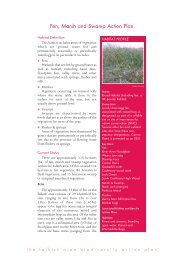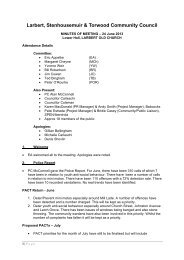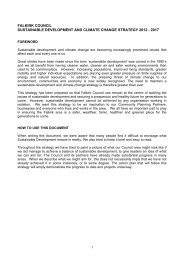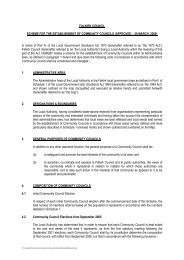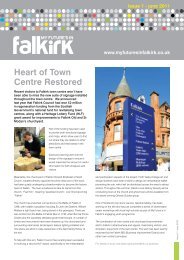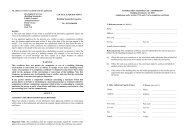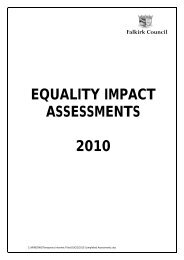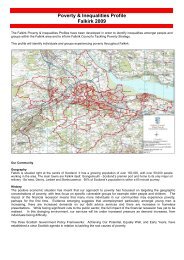2011/2012 audited annual accounts - Falkirk Council
2011/2012 audited annual accounts - Falkirk Council
2011/2012 audited annual accounts - Falkirk Council
Create successful ePaper yourself
Turn your PDF publications into a flip-book with our unique Google optimized e-Paper software.
12. CONTINGENT LIABILITIES<br />
FALKIRK COUNCIL<br />
A contingent liability arises where an event has taken place that gives the <strong>Council</strong> a possible obligation whose<br />
existence will only be confirmed by the occurrence or otherwise of uncertain future events not wholly within the<br />
control of the <strong>Council</strong>. Contingent liabilities also arise in circumstances where a provision would otherwise be<br />
made but either it is not probable that an outflow of resources will be required or the amount of the obligation<br />
cannot be measured reliably.<br />
Contingent liabilities are not recognised in the Balance Sheet but disclosed in the Notes to the Core Financial<br />
Statements. Where such liabilities are reduced through contributions or recoveries from other parties the net<br />
liability is shown. Details of such liabilities are shown in Note 20.<br />
13. PROVISIONS<br />
Provisions are made where an event has taken place that gives the <strong>Council</strong> a legal or constructive obligation that<br />
probably requires settlement by a transfer of economic benefits or service potential and a reliable estimate can be<br />
made of the obligation. Provisions are charged as an expense to the appropriate service revenue account in the<br />
Comprehensive Income and Expenditure Statement in the year that the <strong>Council</strong> becomes aware of the obligation,<br />
based on the best estimate of the likely settlement. When payments are eventually made, they are charged to the<br />
provision set up in the Balance Sheet. Estimated settlements are reviewed at the end of each financial year and<br />
appropriate adjustments made to the level of provision. Any provisions are included in the financial statements in<br />
accordance with IAS37, under Note 25.<br />
14. RESERVES<br />
Reserves are amounts set aside for specific purposes outwith the definition of provisions. They are created by<br />
appropriating amounts out of the General Fund Balance in the Movement in Reserves Statement. When<br />
expenditure to be financed from a reserve is incurred, it is charged to the appropriate service revenue account in<br />
that year and included within the Net Cost of Services in the Comprehensive Income & Expenditure Statement.<br />
The reserve is then appropriated back into the General Fund Balance in the Movement in Reserves Statement so<br />
that there is no net charge against council tax for the expenditure in that year.<br />
Section 93 of the Local Government (Scotland) Act 1973 requires the <strong>Council</strong> to have a General Fund. Schedule<br />
3 to the Local Government (Scotland) Act 1975 also allows local authorities to establish a Repairs and Renewals<br />
Fund, an Insurance Fund and a Capital Fund. Other reserves have also been established to meet the accounting<br />
requirements of the Code.<br />
Certain reserves are kept to manage the accounting processes for non-current assets and financial instruments as<br />
well as retirement benefits and do not represent usable resources for the <strong>Council</strong> – these reserves are explained in<br />
the relevant policies below:<br />
Usable Reserves<br />
Capital Receipts Reserve<br />
Capital Receipts received in the year are available to finance new capital expenditure or to finance the repayment<br />
of principal on existing loans.<br />
Capital Grants Unapplied Account<br />
The Capital Grants Unapplied Account records grants and developers contributions which have been credited to<br />
the Comprehensive Income and Expenditure Statement but have still to be applied to fund capital expenditure.<br />
Once applied, the value will be transferred from the Capital Grants Unapplied Account to the Capital Adjustment<br />
Account.<br />
General Fund<br />
The General Fund relates to the revenue reserves of the <strong>Council</strong>, elements of which are regarded as earmarked<br />
funds e.g. Devolved Schools, New Schools Project, Economic Development and Energy Efficiency.<br />
Housing Revenue Account<br />
The Housing (Scotland) Act 1987 requires the <strong>Council</strong> to account separately for local authority housing<br />
provision and the reserves relate to the activities detailed in Notes 36-38.<br />
13



